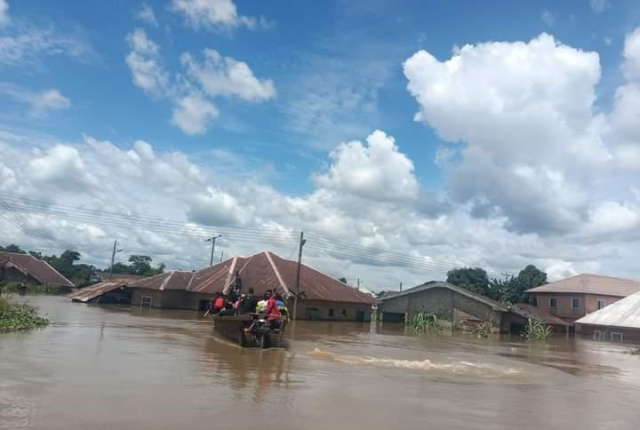
At least 500 people have been killed in floods across Nigeria, an official has said.
Some of the states where deaths from floods have been reported include Kogi, Jigawa, Kebbi and Bayelsa with about 31 states said to have experienced flooding in 2022.
About 90,000 homes have also been partially or totally destroyed in the floods, the official said.
The Permanent Secretary, Ministry of Humanitarian Affairs, Disaster Management and Social Development, Nasir Sani-Gwarzo, made this known during a news conference on Tuesday in Abuja.
“It is on record that over 1.4 million persons were displaced, with about 500 persons reported dead, 790,254 persons moved out of their locations, while 1,546 persons were injured,” he said.
“Similarly, 44, 099 houses were partially damaged, 45,249 houses, totally damaged, 76,168 hectares of farm lands were partially destroyed, while 70, 566 hectares of farm lands were completely destroyed.”
Mr Sani-Gwarzo said the federal government has approved emergency management plans to mitigate the impact of the flood nationwide.
He spoke after the emergency meeting on flood situation with relevant stakeholders in Abuja.
He said government had approved the National Emergency Flood Preparedness and Response Plans to mitigate and reduce the impact of the flood nationwide.
He said that experts responsible for controlling flood disaster had informed the committee that the scale of the 2022 flooding was similar to that of 2012.
He said the meeting would come out with a communique to inform Nigerians that government was not only aware of what the situation was but was prepared to reduce the impact.
According to Mr Sani-Gwarzo, the government is also prepared to make sure that those places and communities not affected, also get some relief materials.
He recalled that early this year, NiMet predicted that some parts of the country would witness increased rain fall and deep into the rainy season, as one of the African countries would release water from its dam.
Mr Sani-Gwarzo explained that the release of the water led to increase in volume of water that Nigeria was taking in.
He added that the release of the water resulted to the flooding, stressing that by the grace of God, the impact would be reduced to the bearest minimum and more lives would be saved.
He said the National Emergency Management Agency came up with relief materials reaching nothing less than 315,000 people that were displaced across the line of the flooding impact.
“The National Emergency Flood Preparedness and Response Plans for Nigeria has just been approved by the Federal Executive Council and it contains all the details of the roadmap that needs to be done.
“It includes the immediate, short term and long term plans and therefore, we have a clear view of what to do and how to go about it, mitigate and reduce the impact of flood in the country.
“We are taking all the necessary actions to bring relief to the people affected by the flood. All the concerned agencies have renewed their commitment to strengthen their efforts in reaching out to the victims and bring relief to them,” he said.
Mr Sani-Gwarzo revealed that during the meeting of the stakeholders, they came out with three prompt approach for the future.
“They include, the immediate actions that would be taken by respective agencies, the short term measures and the long term measures that would be taken by agencies responsible.”







